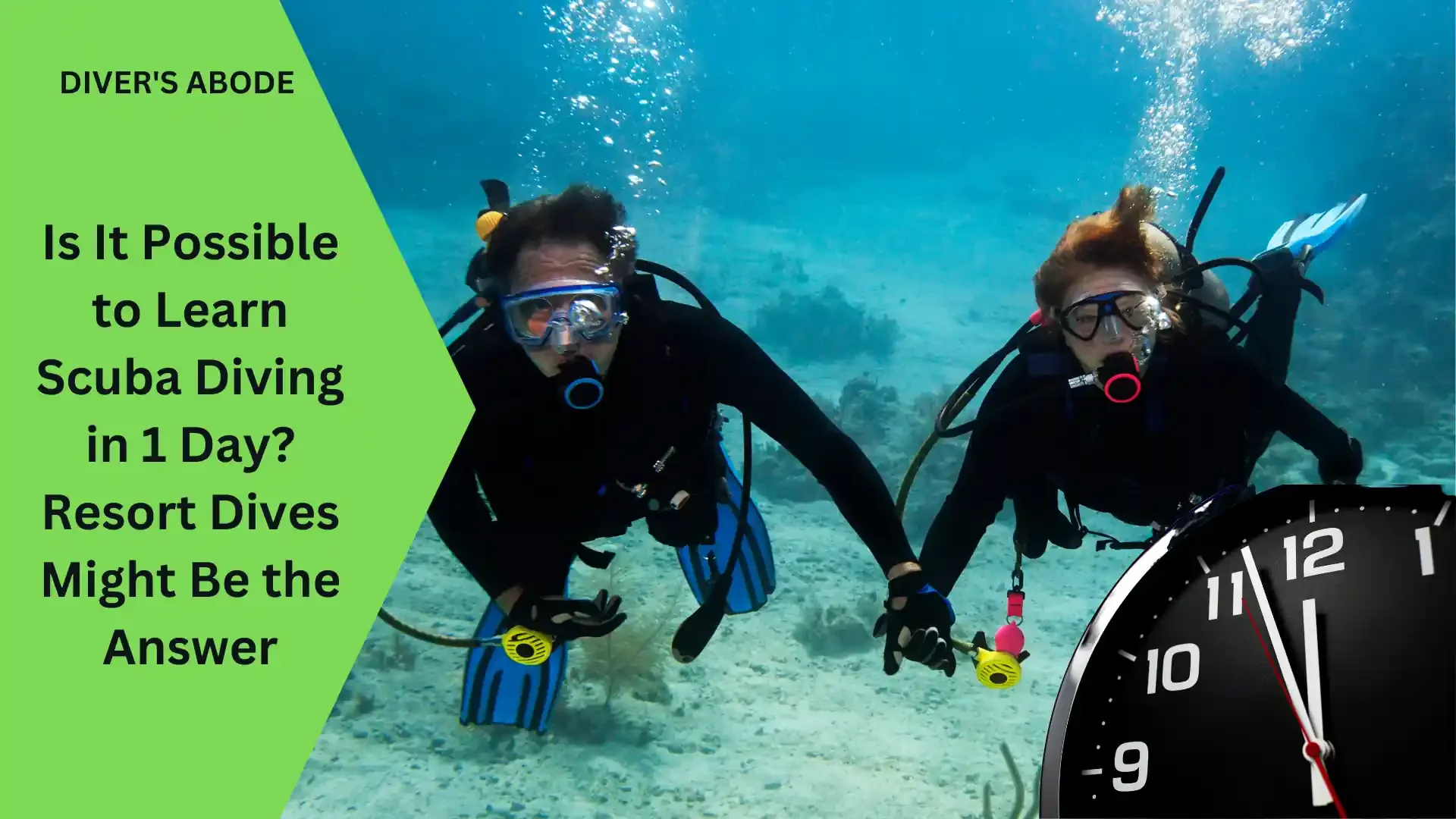Often many of you, while vacationing at some exotic beach destination find out about the alluring dive spot within a stone’s throw of your resort. And suddenly your mind is filled with the whimsical urge to dive there as soon as possible. But there’s one barrier: you don’t know how to scuba dive.
Naturally, the first question that springs to mind is: Can I rummage through the scuba diving basics within a day?
With resort dives, you can learn basic supervised scuba diving within a day and under a few hours. Dive operators and resorts in diving hotspots have come up with various small-duration scuba crash courses for tourists with no previous diving experience. Resort diving is another popular name for these courses.
This article focuses entirely on these introductory resort courses and how efficient they are in preparing you for your scuba diving within a day.
Table of Contents
How Exactly Do Resort Dive Courses Work?

First and foremost, a resort dive course is not to be confused with a scuba certification course. Resort dive courses are introductory and in no way impart the same level of knowledge and expertise you gain from a traditional scuba certification course.
Resort dive courses allow you to take a quick dive in a relatively safe diving spot without going through the hassle of certifications.
These courses are only valid for one day, unlike scuba certifications with lifelong validity.
Are There Any Prerequisites for Enrollment in A Resort Dive?
There are absolutely no prerequisites to get enrolled in a Resort Crash Course! You are not even required to know swimming. The enrollment process is as simple as visiting the nearest dive center with a towel and bathing suit.
If you know how to swim that’s an added advantage for you and might bring down the course duration by an hour or two since you can pretty much skip on the water adaptation basics.
How Costly Are the Resort Dive Courses?
The common resort dive courses cost $40-$50 but some courses offered by other private agencies may cost upwards of $100. This cost includes your training scuba gear rental and the expended breathing gas (only during your pool training session).
Generally, gear rental and gas expenditure for your first open-water dive are counted separately but it’s nominal ($20 at most).
A Brief Rundown of The Resort Diving Process
The course begins with a 30-minute to an hour-long theoretical lecture on scuba diving, you know, the bits and bobs on neutral buoyancy, all working mechanisms of scuba equipment, decompression sickness, barotrauma, the importance of breathing techniques, and such.
Afterward, you’re taken to an enclosed pool by the dive instructor for a hands-on approach to the things you learned in the lectures before. This session can last between 1-3 hours depending on how quickly you grasp the practical techniques. Rest assured, if you know how to free float horizontally you’ll find this session pretty easy to follow through.
Now that you’ve pretty much grasped the basic foundations, comes the most exciting part- your first-ever single-tank open-water dive experience. You’ll be accompanied by your dive instructor to the nearest dive location and will be guided on an actual dive in the sea. You will be confined within 30 feet and under the constant supervision of your instructor (it gets annoying at times).
Generally, most people who enroll in resort diving courses end up taking a scuba certification course sooner or later.
Recommended Resort Diving Courses
Nowadays every dive resort or dive shop under the sun offers this kind of introductory scuba crash course. But not all of them have the same quality of training as the ones offered by reputed scuba agencies like PADI and SSI.
Yeah, you heard that right. Both PADI and SSI offer fast-track resort diving courses too besides their usual certifications. As for which one you want to go for that’s totally up to you. Both PADI and SSI are the premiers in the field but they do take a fundamentally different approach to their training methods.
The introductory scuba course offered by PADI is called “Discover Scuba” which is exactly what it sounds like: helps you to dip your feet into the world of scuba. The SSI equivalent of an introductory scuba crash course is “Try Scuba” and is another excellent choice for you to consider.
If you’re still not sure which agency between PADI and SSI to rely on, you may want to consult our exclusive guide on choosing between PADI and SSI for your scuba diving lessons.
Are These Scuba Crash Courses Safe?
That depends on what your aim for taking this course was. If you want to have a swift one-time scuba experience under supervision these courses are safe and time-efficient. These resort diving courses are also good for helping you make up your mind if you’re still on the fence about scuba diving.
But taking this course alone is not safe if you plan to go diving on your own. If long-term scuba diving is your goal it’s better if you directly enroll in an open-water certification course and skip scuba crash courses entirely.
To Wrap Up
These new scuba diving fast-track programs are only for supervised scuba diving and are not recommended traditional scuba certification courses. One-day games are a great way to ease into a sport, but you should never think of them as real practice.
But taking into consideration the fact that not every one of you is looking forward to pursuing diving as a full-time hobby I get behind your decision. However, looking at the numbers and recent trends I am pretty confident that once you have the urge to try out scuba diving you’ve entered the inescapable rabbit hole and you’ll eventually come out of the other end as a full-time diver like everyone else.
